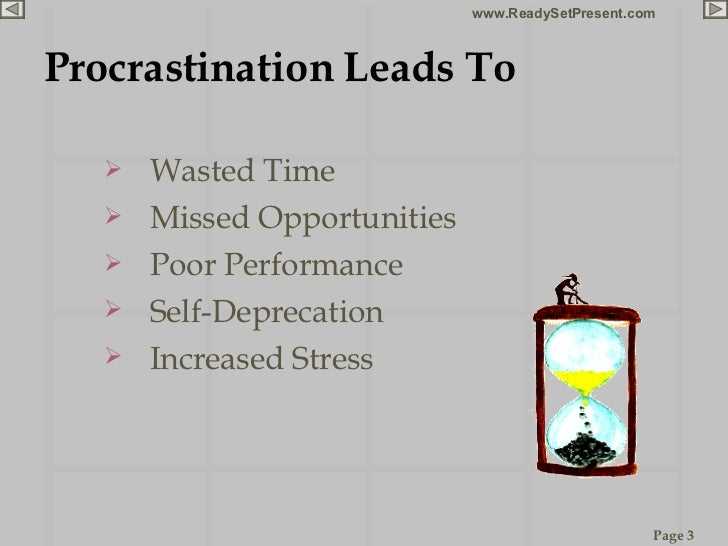Procrastination is a common evil that plagues many individuals in today’s fast-paced world. It is the act of delaying or postponing tasks that need to be completed, often leading to feelings of guilt, stress, and a hindrance in personal and professional growth. In a society that values productivity and efficiency, procrastination can be a significant barrier to success.
While everyone procrastinates from time to time, there are certain signs that indicate a chronic procrastinator. These signs not only provide insight into one’s behavior but also act as warning signs for the potential problems that lie ahead. By recognizing these signs, individuals can take steps to address their procrastination habits and move towards a more productive and successful life.
One of the most common signs of procrastination is the persistent habit of delaying tasks or assignments until the last minute. This behavior often stems from a fear of failure, perfectionism, or a lack of motivation. Procrastinators often find themselves rushing to complete tasks before a deadline, leading to decreased quality of work and increased stress levels.
Another sign of procrastination is the tendency to engage in unproductive activities as a form of escapism. This can include spending excessive amounts of time on social media, watching television, or engaging in other distractions that provide immediate gratification but little progress towards goals. Procrastinators may use these activities as a way to avoid the discomfort or uncertainty associated with tackling important tasks.
A lack of proper planning and prioritization is another telltale sign of procrastination. Procrastinators often struggle with time management skills and find it challenging to set goals or establish a clear plan of action. As a result, they may find themselves overwhelmed with a mounting to-do list and struggle to make progress on important tasks.
Procrastinators also tend to underestimate the time required to complete a task, leading to a constant feeling of being behind schedule. This can create a vicious cycle of procrastination as individuals become overwhelmed by the workload, leading to increased stress and avoidance of tasks.
In addition to these signs, procrastinators may also experience a constant sense of guilt or shame about their procrastination habits. They may recognize that their behavior is counterproductive and detrimental to their success but find it challenging to break the cycle. This guilt can further contribute to the procrastination cycle as individuals become caught up in negative self-talk and feelings of unworthiness.
Overall, recognizing the signs of procrastination is the first step towards overcoming this self-destructive habit. By understanding the underlying causes and implementing strategies to address these behaviors, individuals can break free from the chains of procrastination and work towards achieving their goals and ultimate success.
Lack of Motivation:
One of the biggest signs of procrastination is a lack of motivation. When you find it difficult to start or complete tasks, it could be a sign that you’re lacking motivation. Here are a few indicators that you may be struggling with motivation:
- Difficulty concentrating: If you find it hard to focus on the task at hand and constantly find yourself getting distracted, it could be a sign that you’re lacking motivation.
- Lack of enthusiasm: When you’re not excited or passionate about a task, it can be challenging to find the motivation to get started. This lack of enthusiasm can lead to procrastination.
- No clear goals: Without clear goals, it can be difficult to find the motivation to take action. When you’re unsure of what you’re working towards, it’s easy to put things off.
- Feeling overwhelmed: If you feel overwhelmed by the size or complexity of a task, it can be demotivating. The sense of being overwhelmed can lead to procrastination as a way to avoid facing the challenge.
To overcome a lack of motivation, it’s important to find ways to reignite your enthusiasm and set clear goals. Break large tasks into smaller, more manageable chunks to make them less overwhelming. By addressing the underlying causes of your lack of motivation, you can start to overcome procrastination and move closer to success.
Constantly Making Excuses:
Making excuses is a common sign of procrastination. When you constantly find reasons to delay or avoid taking action, it can be a strong indication that you are hesitant or unwilling to start a task or project. Excuses can range from being too busy, feeling tired, or not having the necessary resources.
While it’s normal to have genuine reasons for delaying tasks at times, constantly making excuses can become a habit that hinders your progress and success. It allows you to justify your inaction and avoid facing the uncomfortable or challenging aspects of a task.
Making excuses can also be a way of protecting your ego. By coming up with reasons why you can’t start or complete something, you avoid the possibility of failure or criticism. This fear of failure can keep you trapped in a cycle of delaying success and never reaching your full potential.
To overcome this habit of constantly making excuses, it’s important to challenge your thoughts and beliefs. Ask yourself if your excuses are valid or if they are just a way of avoiding the task. Recognize that failure and mistakes are part of the learning process, and taking action is necessary for growth.
Creating a realistic plan, breaking tasks into smaller, manageable steps, and setting specific deadlines can also help overcome the tendency to make excuses. Accountability partners or seeking support from others can provide the encouragement and motivation needed to push through excuses and get started on your goals.
By acknowledging and addressing this sign of procrastination, you can break free from the habit of constantly making excuses and take the necessary steps towards success.
Difficulty Starting Tasks:
One of the key signs of procrastination is difficulty starting tasks. Procrastinators often struggle to begin working on important projects or tasks, finding themselves easily distracted or avoiding the work altogether.
Here are some common behaviors and thoughts that may indicate difficulty starting tasks:
- Feeling overwhelmed by the size or complexity of a task
- Becoming easily distracted by less important activities
- Engaging in excessive planning or preparation instead of taking action
- Experiencing anxiety or fear of failure, leading to avoidance
- Constantly seeking perfection before starting, leading to delays
- Procrastinating by focusing on other less important tasks
- Feeling disorganized and not knowing where to begin
Difficulty starting tasks can be a result of various underlying reasons, such as fear of failure, lack of motivation, or feeling overwhelmed. However, it is important to recognize and address these issues in order to overcome procrastination and achieve success.
Overcoming Difficulty Starting Tasks:
Here are some strategies that can help you overcome difficulty starting tasks and combat procrastination:
- Break tasks into smaller steps: Breaking down large tasks into smaller, more manageable steps can make them less daunting and easier to start.
- Set clear goals and deadlines: Clearly define your goals and set specific deadlines for each task to create a sense of urgency and structure.
- Eliminate distractions: Identify and remove any distractions that might hinder your focus and ability to start tasks.
- Establish a routine: Develop a consistent routine or schedule to create a habit of starting tasks at a specific time or in a specific order.
- Practice self-reflection: Reflect on past successes and identify what motivates you to start tasks. Use this knowledge to boost your motivation and overcome procrastination.
- Seek accountability: Share your goals and deadlines with someone else who can hold you accountable and provide support and encouragement.
- Start with the most difficult task: Tackle the most challenging task first when your energy and motivation are high, as this can create momentum to continue working on other tasks.
By recognizing the signs of difficulty starting tasks and implementing strategies to overcome procrastination, you can increase your productivity and ultimately achieve success.
Poor Time Management:
Poor time management is one of the key signs of procrastination. If you find yourself constantly running out of time or being unable to meet deadlines, you may be struggling with managing your time effectively.
One sign of poor time management is constantly being late or missing appointments. If you frequently find yourself rushing from one task to another or running behind schedule, it may be time to reevaluate how you prioritize your tasks and manage your time.
Another sign of poor time management is constantly feeling overwhelmed and stressed. When you don’t manage your time effectively, it’s easy to feel like there is never enough time to get everything done. This can lead to increased stress levels and a decreased ability to focus on the tasks at hand.
Poor time management can also manifest in a lack of organization. If your workspace is cluttered and disorganized, it can make it difficult to find what you need when you need it, wasting valuable time searching for important documents or tools.
Another sign of poor time management is multitasking. While it may seem like you are being productive by juggling multiple tasks at once, studies have shown that multitasking actually decreases productivity and increases the likelihood of making mistakes.
If you frequently find yourself procrastinating or wasting time on unimportant tasks, it may be a sign of poor time management. This can include spending excessive time on social media, watching TV, or engaging in other activities that don’t contribute to your goals or priorities.
To improve your time management, consider creating a schedule or to-do list to prioritize your tasks. Set specific deadlines for each task and break larger tasks into smaller, more manageable steps. Eliminate distractions, such as turning off notifications on your phone, to help you stay focused and on track with your tasks.
Putting Off Important Decisions:
One common sign of procrastination is putting off important decisions. This can manifest in different ways and can have significant consequences for your success and well-being.
1. Indecision: One sign of putting off important decisions is indecision. You may find yourself constantly weighing the pros and cons without taking any action. This can lead to missed opportunities and a lack of progress.
2. Avoidance: Another sign is avoidance. You may actively avoid making a decision because it feels overwhelming or uncomfortable. This can cause anxiety and keep you stuck in a state of indecision.
3. Passing the buck: Procrastination can also manifest as passing the responsibility for decision-making onto others. Instead of taking charge and making a choice, you may defer to someone else or seek validation from others before making a decision.
4. Analyzing too much: While it’s important to consider the pros and cons, over-analyzing can lead to decision paralysis. You may find yourself endlessly researching and seeking more information, which can lead to a cycle of indecision.
5. Feeling overwhelmed: Putting off important decisions can often lead to feeling overwhelmed. The more you delay, the more the decision looms over you, causing stress and anxiety.
6. Lack of progress: Procrastinating on important decisions can hinder your progress and success. By not taking action, you may miss out on opportunities or delay your goals and aspirations.
7. Regret: Finally, one of the most significant consequences of procrastinating on important decisions is regret. When you continually put off making important choices, you may look back and realize the opportunities you missed or the negative impact it had on your life.
To overcome this form of procrastination, it’s important to recognize and acknowledge your fear of making decisions. Break the decision down into manageable steps, seek support or guidance when needed, and focus on the potential positive outcomes of taking action.
| 1. | Set deadlines for yourself |
| 2. | Break tasks into smaller, more manageable steps |
| 3. | Recognize and challenge your excuses |
| 4. | Seek accountability from a trusted friend or mentor |
| 5. | Practice self-compassion and forgive yourself for past procrastination |
| 6. | Visualize the positive outcomes of taking action |
| 7. | Celebrate your progress and small victories |
By recognizing the signs of procrastination and taking proactive steps to overcome it, you can make important decisions and move closer to success.
Procrastinating with Distractions:
One of the most common signs of procrastination is indulging in distractions. When you find yourself constantly reaching for your phone, browsing social media, or getting lost in a Netflix binge instead of tackling important tasks, it’s a clear indication that you’re avoiding what needs to be done.
Here are some common forms of procrastination through distractions:
- Social Media: Spending excessive time scrolling through Facebook, Instagram, Twitter, or any other social media platform can be a major distraction from your priorities.
- Online Shopping: Getting caught up in the world of online shopping can be a tempting distraction. Instead of focusing on your work or responsibilities, you find yourself browsing through endless products and making unnecessary purchases.
- TV Shows and Movies: Procrastinators often turn to TV shows or movies as a means of escapism. It can be easy to get hooked on a new series or spend hours watching movies instead of working towards your goals.
- Video Games: Gaming can be a highly addictive distraction for procrastinators. It’s easy to lose track of time and become engrossed in the virtual world, putting off important tasks.
- Constant Phone Checking: Procrastinators often have a habit of constantly checking their phones for notifications, messages, or updates. This constant distraction can derail productivity and delay success.
These distractions not only waste valuable time but also hinder your progress towards achieving success. Recognizing these forms of procrastination and actively working to minimize or eliminate them is crucial for overcoming procrastination and increasing productivity.
By creating a structured schedule, setting clear goals, and eliminating or reducing distractions, you can stay focused and on track towards achieving your goals. It’s important to prioritize your time and make a conscious effort to avoid getting caught up in distractions that hinder your progress.
Remember, success requires discipline and the ability to stay focused, even in the face of tempting distractions. By acknowledging and addressing your procrastination habits, you can break free from the cycle of delay and pave the way for success.
Feeling Overwhelmed
One of the major signs of procrastination is feeling overwhelmed. When you have a lot of tasks to complete, it’s easy to become overwhelmed and unsure of where to start. This feeling of overwhelm can lead to procrastination as you feel paralyzed by the sheer volume of work.
When you are overwhelmed, it can be helpful to break down your tasks into smaller, more manageable chunks. This will not only make the tasks seem more doable, but it will also give you a clear starting point. Prioritize your tasks based on urgency and importance, and tackle them one at a time.
Another strategy for dealing with overwhelm is to create a schedule or to-do list. By creating a plan, you can better manage your time and ensure that each task is given the attention it deserves. Use tools such as calendars, task management apps, or a simple pen and paper to keep track of your schedule and stay organized.
It’s also important to recognize when you need help. Sometimes, feeling overwhelmed can be a sign that you have taken on too much or that you need assistance. Don’t be afraid to delegate tasks or ask for support when needed. Remember, success is not achieved alone, and it’s okay to reach out for help.
Lastly, try to adopt a mindset of progress, not perfection. Perfectionism can often lead to overwhelm and procrastination, as you may feel like you need to do everything perfectly or not at all. Instead, focus on making small steps forward and celebrating each accomplishment along the way. Remember, success is a journey, and every step counts.
By recognizing and addressing feelings of overwhelm, you can overcome procrastination and achieve success.
Questions and answers
How can I recognize if I am procrastinating?
There are several signs that can indicate if you are procrastinating. These signs include constantly delaying or postponing tasks, making excuses to avoid doing work, feeling overwhelmed or anxious about starting a task, constantly seeking distractions, experiencing a lack of motivation or energy, frequently feeling guilty or ashamed about not completing tasks, and frequently missing deadlines or submitting work at the last minute.
Why do people procrastinate?
People procrastinate for various reasons. Some common reasons include a fear of failure or success, feeling overwhelmed by a task, a lack of motivation or interest in the task, poor time management skills, perfectionism, and a tendency to prioritize short-term gratification over long-term goals.
What are the consequences of procrastination?
Procrastination can have both short-term and long-term consequences. In the short-term, procrastination can lead to increased stress, anxiety, and guilt as tasks pile up and deadlines approach. It can also impact your productivity and hinder your ability to reach your goals. In the long-term, chronic procrastination can damage your reputation, hinder your career advancement, and prevent you from achieving your full potential.
How can I overcome procrastination?
There are several strategies that can help you overcome procrastination. First, break tasks down into smaller, more manageable steps. Prioritize the most important tasks and tackle them first. Set specific, achievable goals and create a schedule or timeline to follow. Minimize distractions by creating a dedicated work environment and using productivity tools or techniques. Hold yourself accountable by telling others about your goals or seeking support from a friend or mentor. Finally, reward yourself for completing tasks and celebrate your achievements along the way.


